No! I am No Singular Instrument
Various Small Fires (Los Angeles, CA)
6.4–7.9.2016
curated by Samuel Kenswil
Built environments sculpt and erode us, permeable and penetrable. Architecture and signage move us through structures erected to suit flows of capital first, and people perhaps somewhere down the line. Notice your chair: is your spine in a C or S formation? Design molds us into shapes; so do politics, expanding or limiting our range of motion.
Bodies are highlighted by absence: those left out of history and images, deemed applicable for negation, or willingly eschewing representation. LGBT people are made absent by a legacy of death, visible in shuttered social spaces, looming in self-conception.
Taxonomies expand and contract as ethics shift. We anthropomorphize flora and fauna which lack lingual vocal cords. The real estate of your presence is always a development opportunity: the material of flesh changeable through repetitive exertion. Are you unsettled by the proximity of you to the things around you? How did you end up looking so much like your room?
Meaning changes from context to context; so do you. You spread your selves out like limbs do.
There is a persistent attempt to gather visual markers as a cohesive subjectivity, a whole person made ergonomically into political certitude. An individual, through forced applicability of well-intentioned political ends, operates as means to the reproduction of norms. Trending language favors “bodies” over “people,” abstracting those “bodies” whose corporeality would be politically constituted: a body that fits into, a body that works. You ... abridged.
—Samuel Kenswil
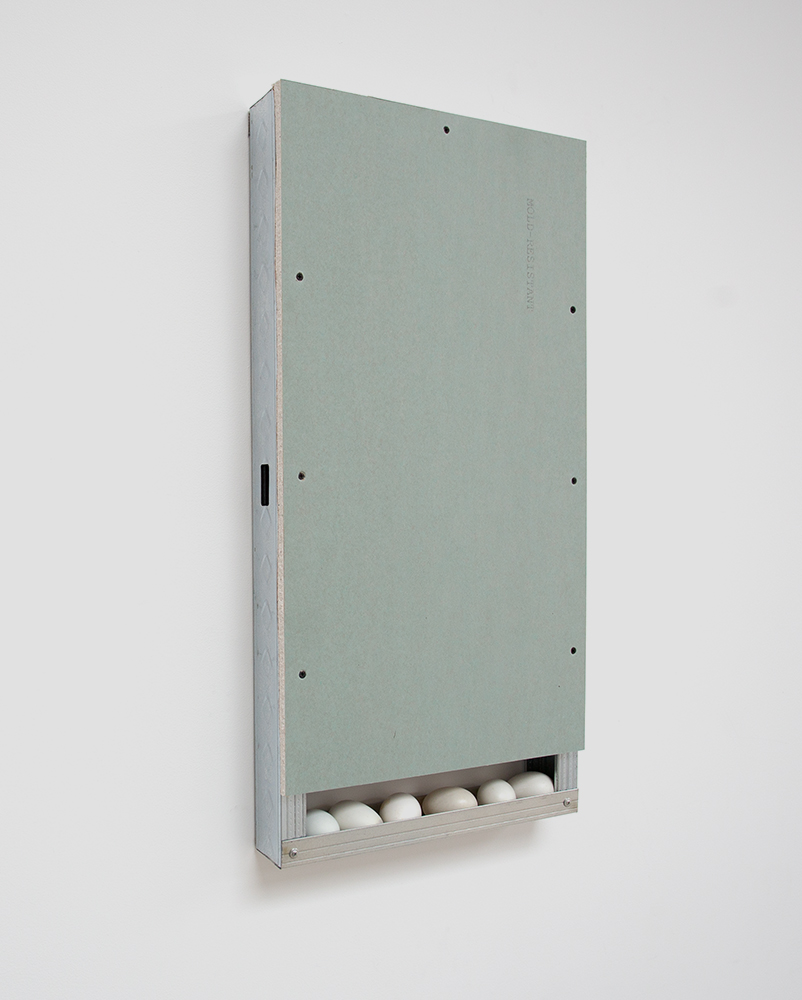
Gypsum Battery with Clearance
Duck eggs, drywall, aluminum studs
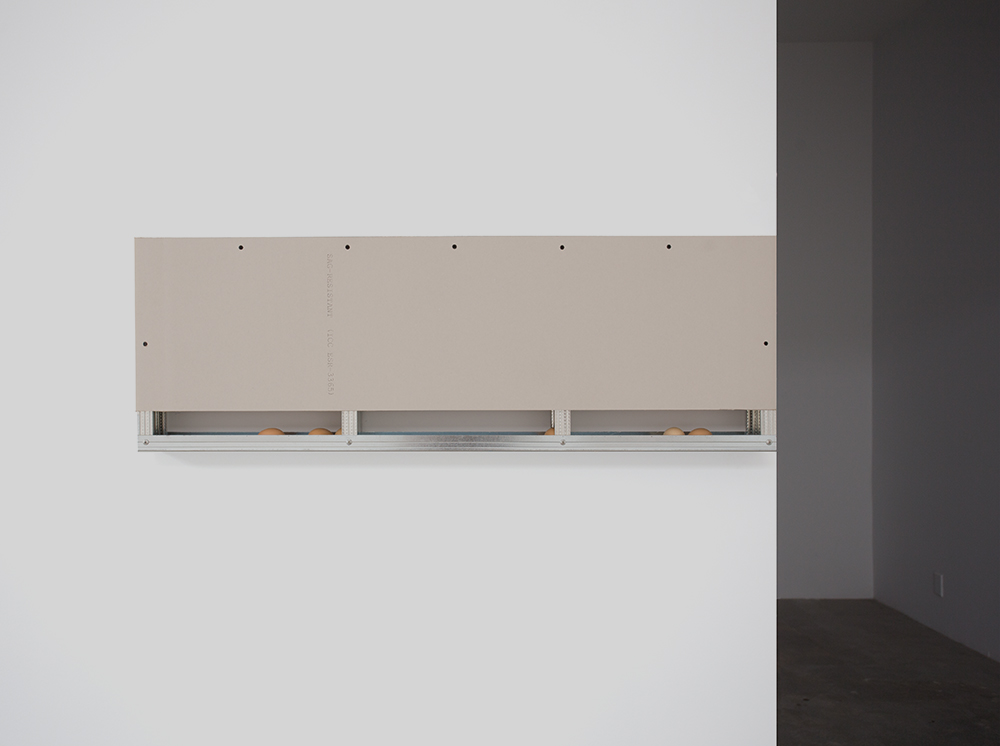
Gypsum Battery with Clearance
Chicken eggs, drywall, aluminum studs
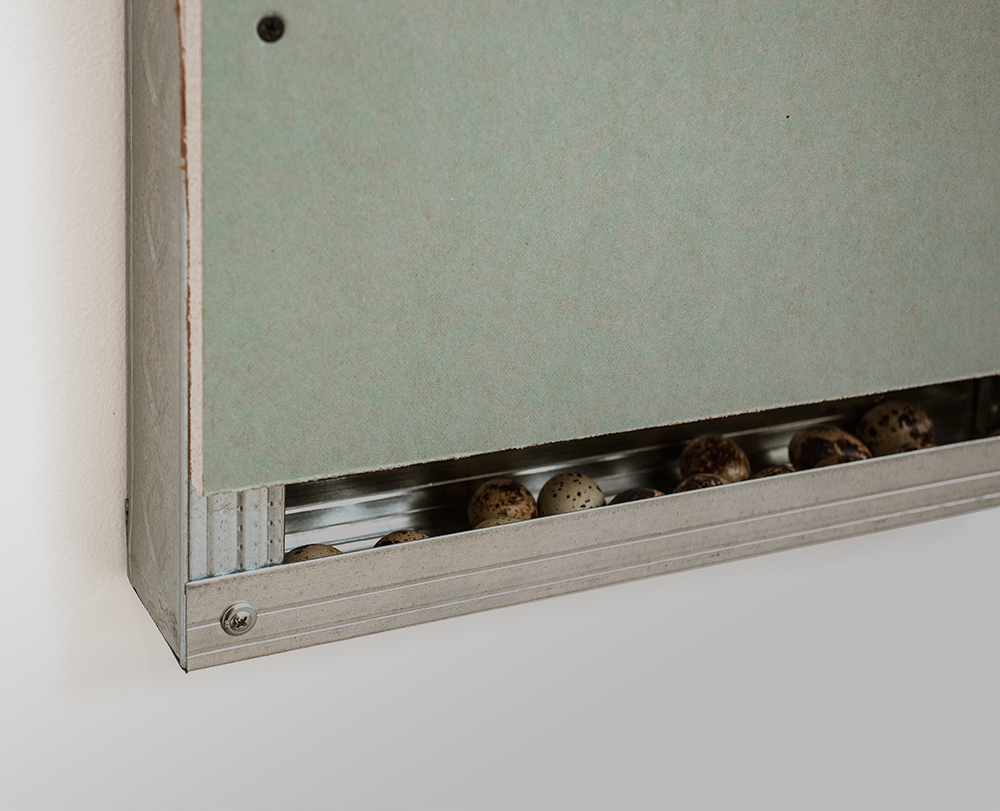
Gypsum Battery with Clearance (detail)
Quail eggs, drywall, aluminum studs
Poorly Planned Honor Racks
American Medium (Brooklyn, NY)
3.25–4.30.2015
I can read the paper on sticks at the library. The racks aren’t always organized and the sticks are often left behind on tables. The New York Times is held behind the desk in a locked drawer–I can check it out for up to 1 hour in exchange for my ID. Sometimes I’ll buy the Los Angeles Times on my block at a navy blue honor rack for $1.50. If the honor rack is empty I’ll grab a copy at 7/11.
Newspapers are a little harder to find south of here. I’m not really sure who’s responsible for this. The paper hasn’t always been equally available to everyone. It wasn’t until June 17, 1988 that an ordinance allowing newspaper rack placement at the discretion of the mayor in Ohio was overturned by the United State Supreme Court in a 4-3 ruling. It cited that the ordinance could potentially be used to penalize newspapers that criticize the local government. [1]
I didn’t move here with all my books but I’m trying to invest in printed text to rebuild my library. I like the convenience of my Kindle but I have to admit, it is a pretty soulless ritual to read fiction, non-fiction, and the news in some font called Caecilia. I tried Baskerville for a while but it’s an in-house type we use at work so I try to avoid it in my personal space.
Leisure time is important to me. I try to limit my internet use to the office and the studio—I think this makes me more efficient but I find myself cheating (tethering) sometimes. My spaces have different privileges—sometimes technology should be rejected. I like to think that I’m in control of my time or relationship to a larger network. I want to police myself.
1. http://www.nytimes.com/1988/06/18/us/supreme-court-roundup-law-that-allowed-mayor-rule-newspaper-racks-overturned.html
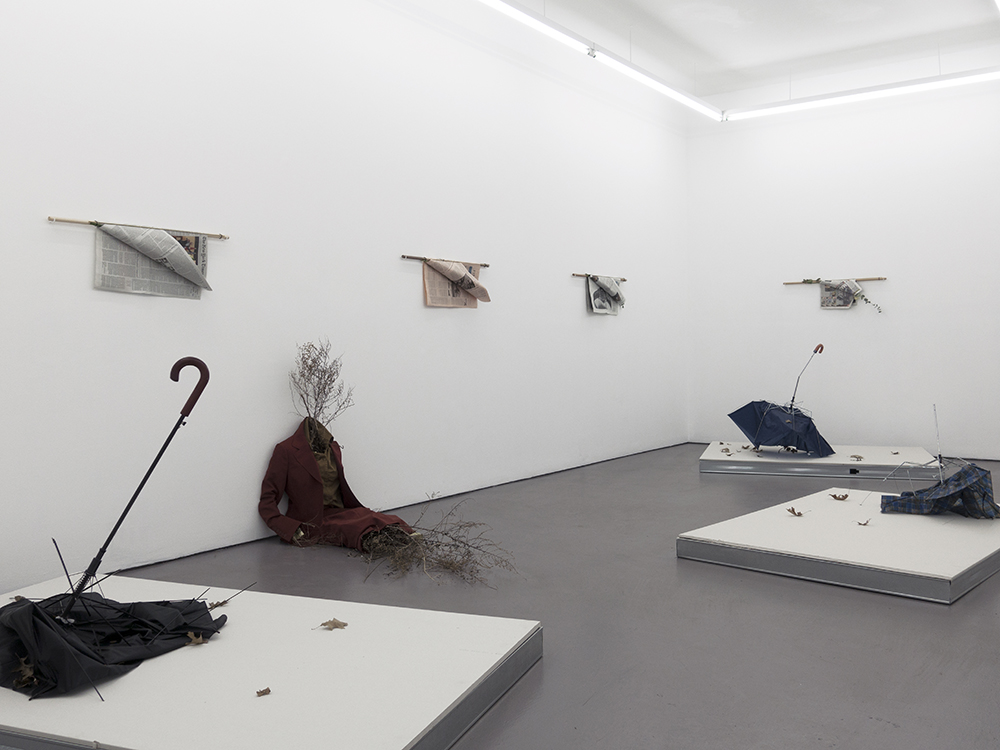
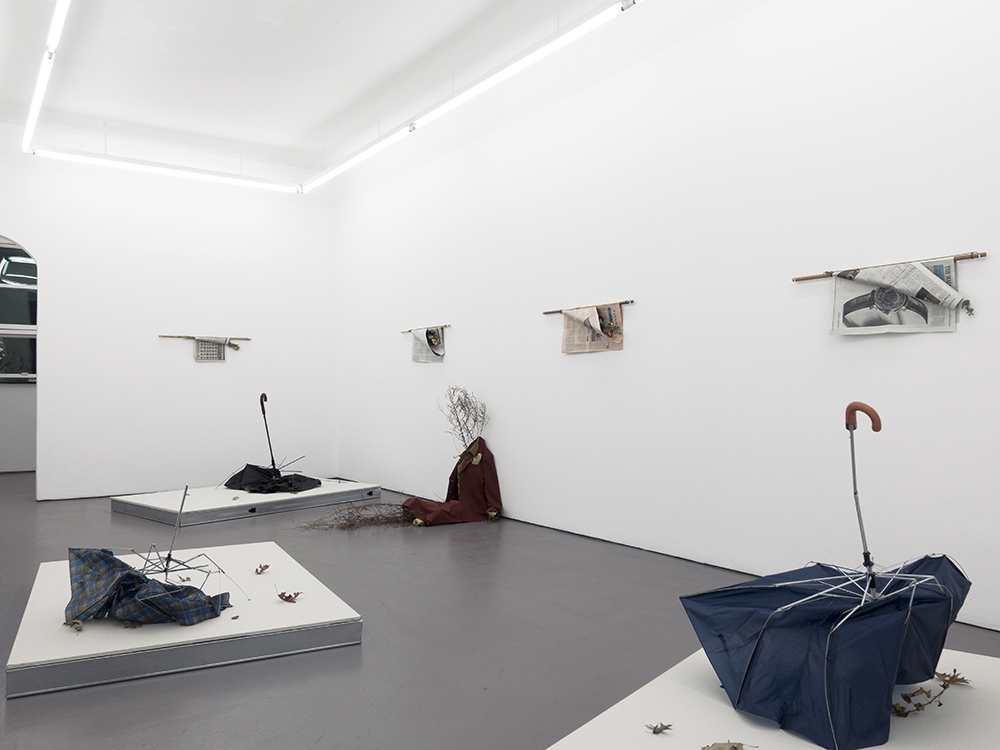
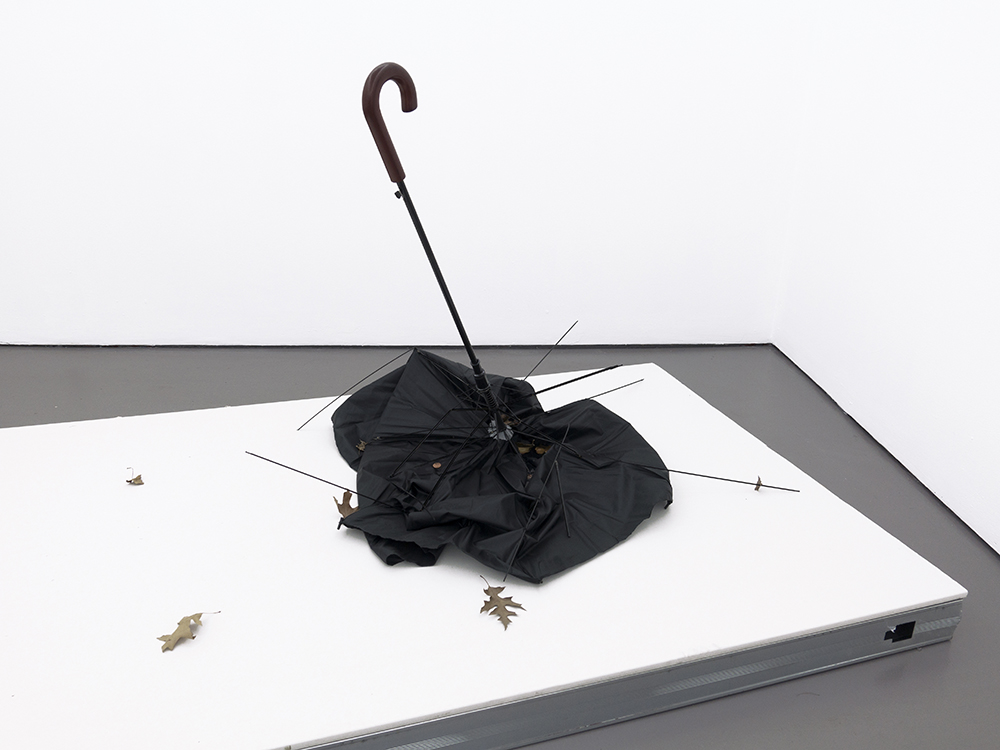
Abandoned Umbrella
umbrella, drywall, aluminum studs, leaves, water, and pennies
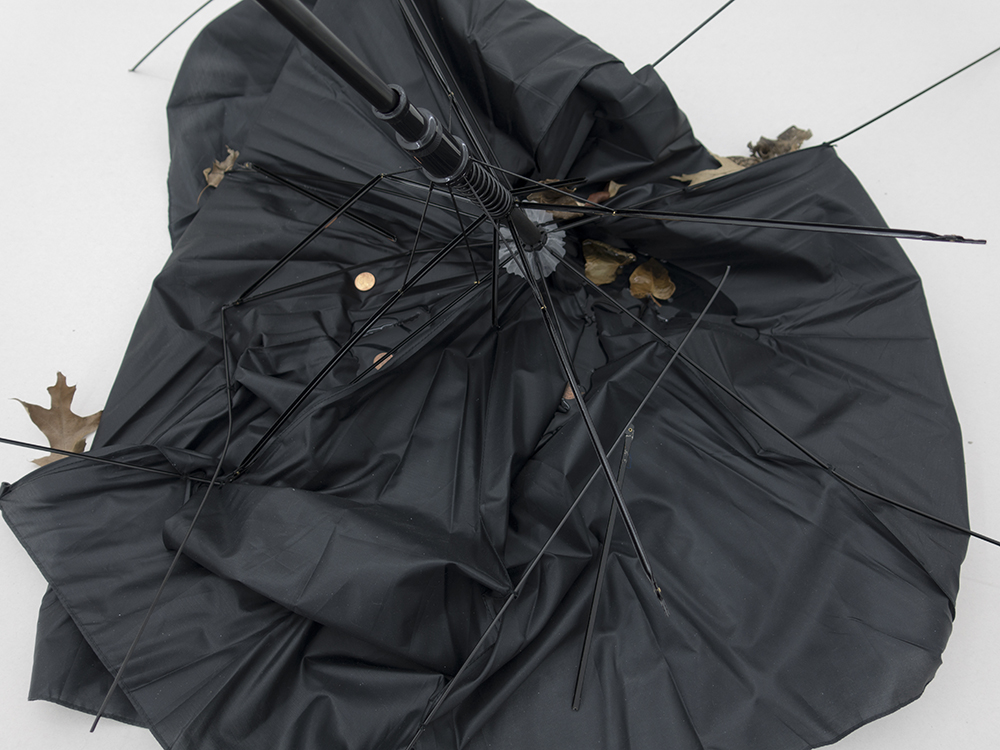
Abandoned Umbrella (detail)
umbrella, drywall, aluminum studs, leaves, water, and pennies
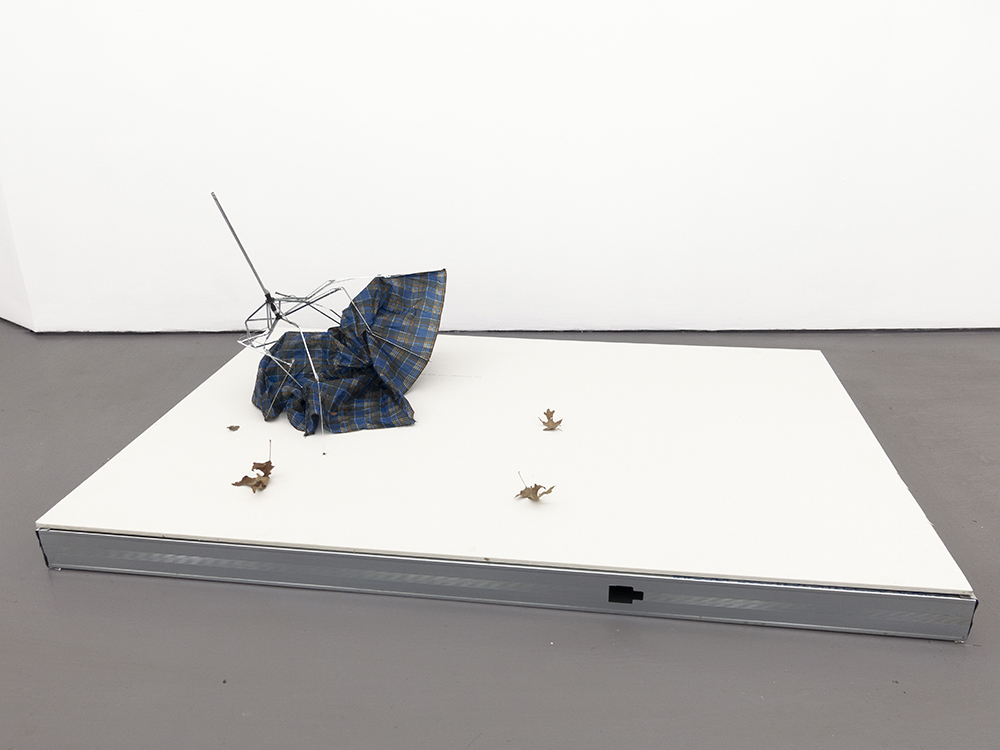
Abandoned Umbrella
umbrella, drywall, aluminum studs, leaves, water, and pennies
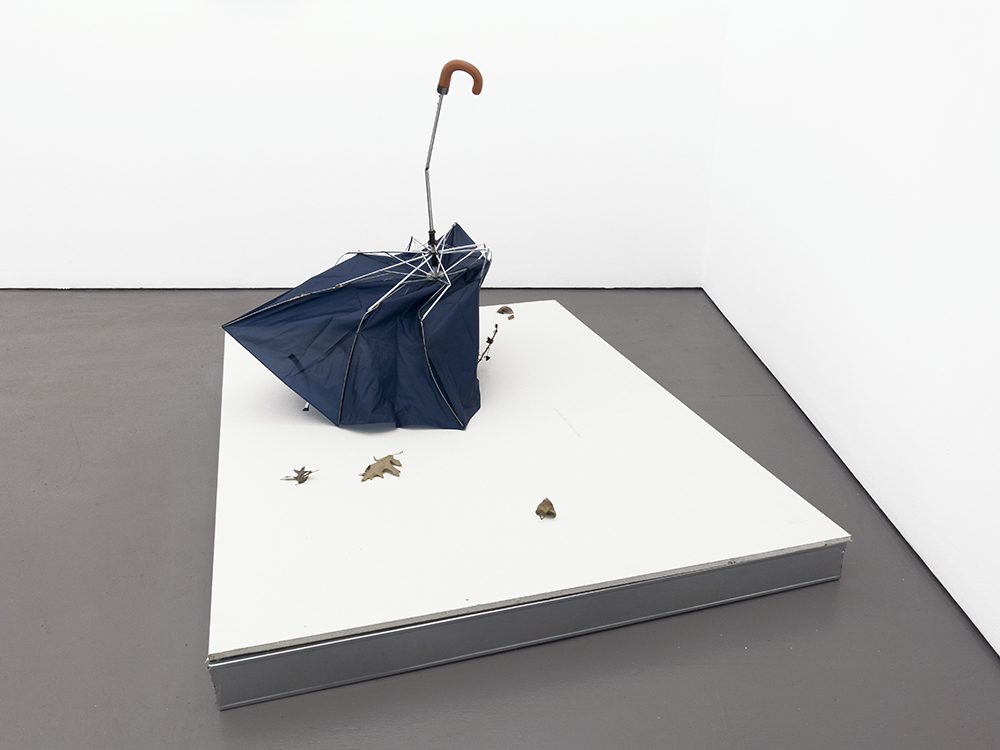
Abandoned Umbrella
umbrella, drywall, aluminum studs, leaves, water, and pennies
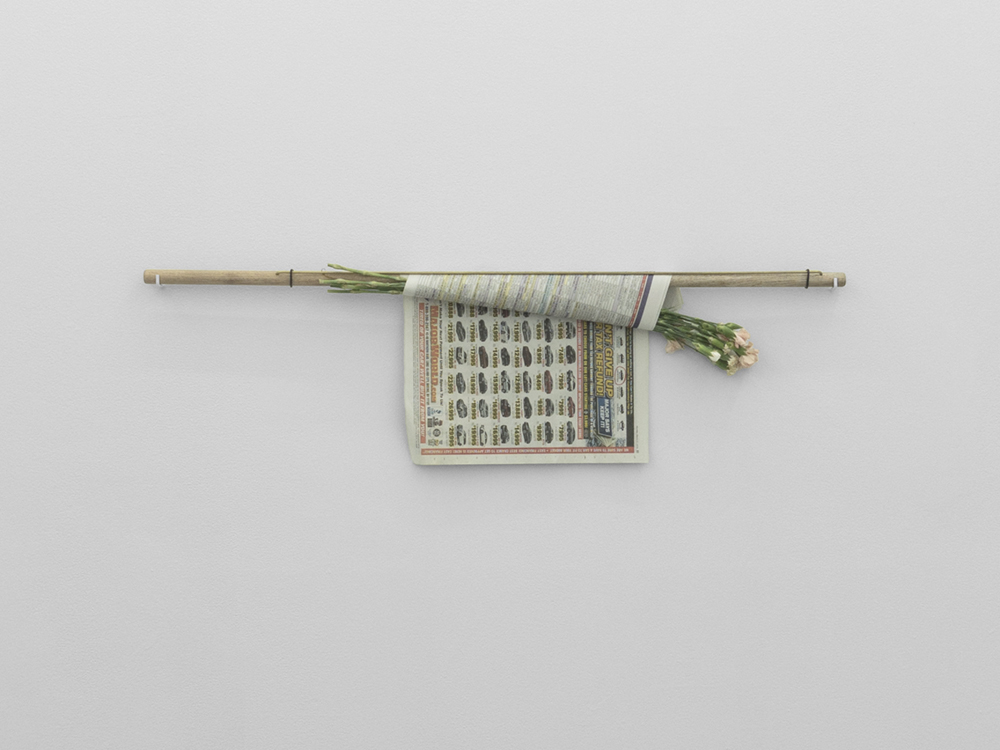
Monday Newspaper Stick
newspaper, flowers, pine, brass rod, and rubber ring
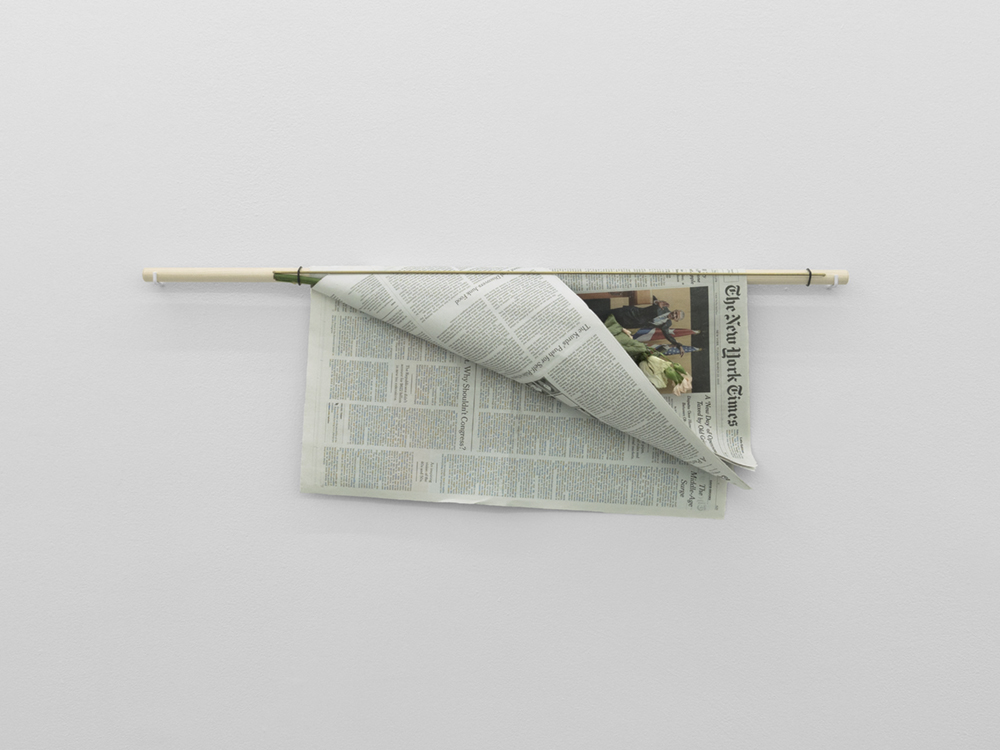
Tuesday Newspaper Stick
newspaper, flowers, poplar, brass rod, and rubber ring
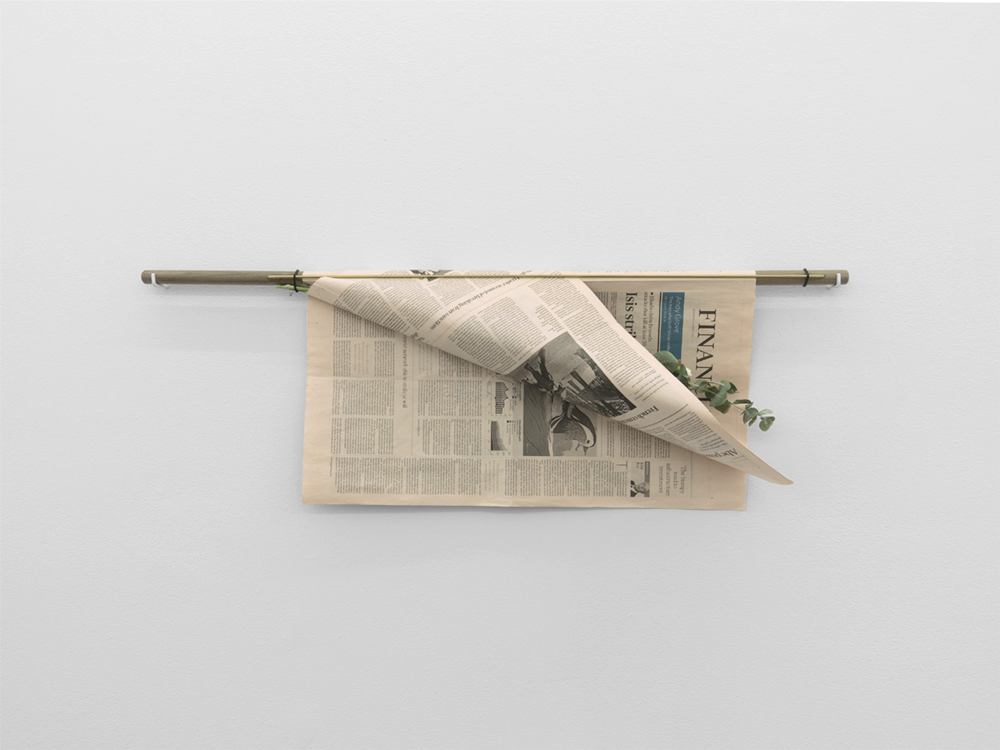
Wednesday Newspaper Stick
newspaper, flowers, walnut, brass rod, and rubber ring
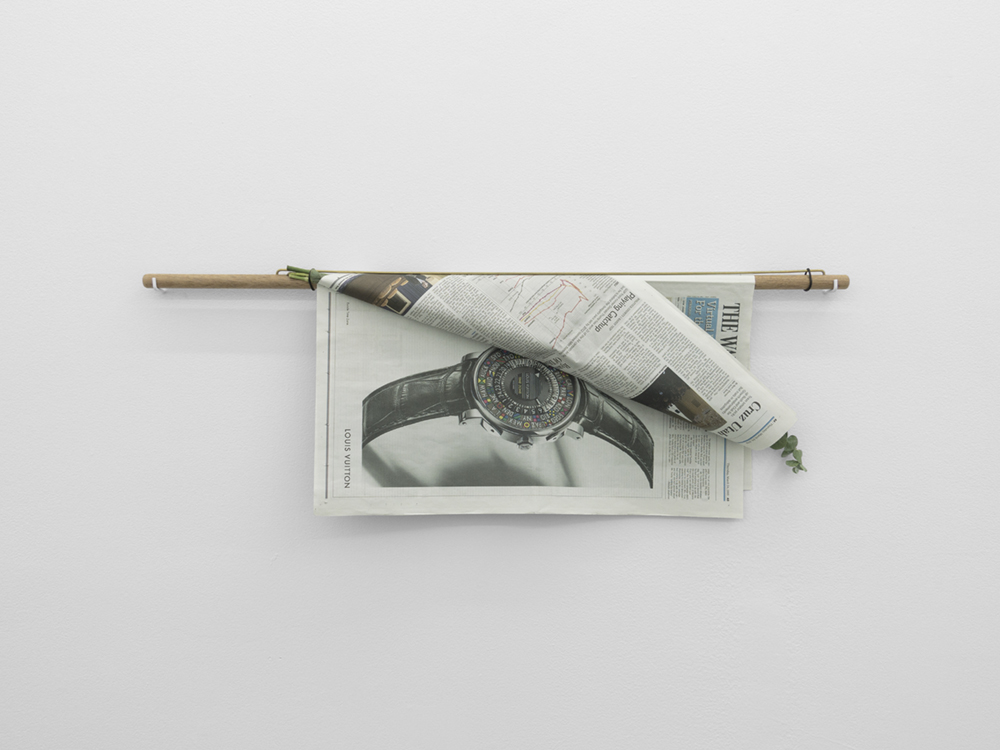
Thursday Newspaper Stick
newspaper, flowers, oak, brass rod, and rubber ring
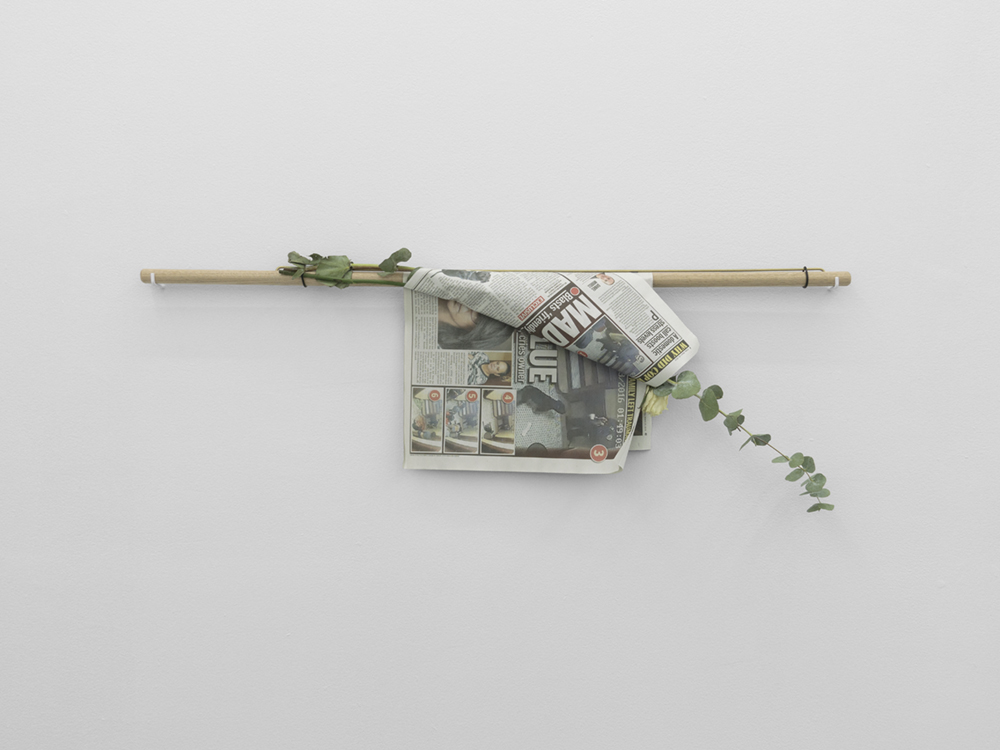
Friday Newspaper Stick
newspaper, flowers, oak, brass rod, and rubber ring
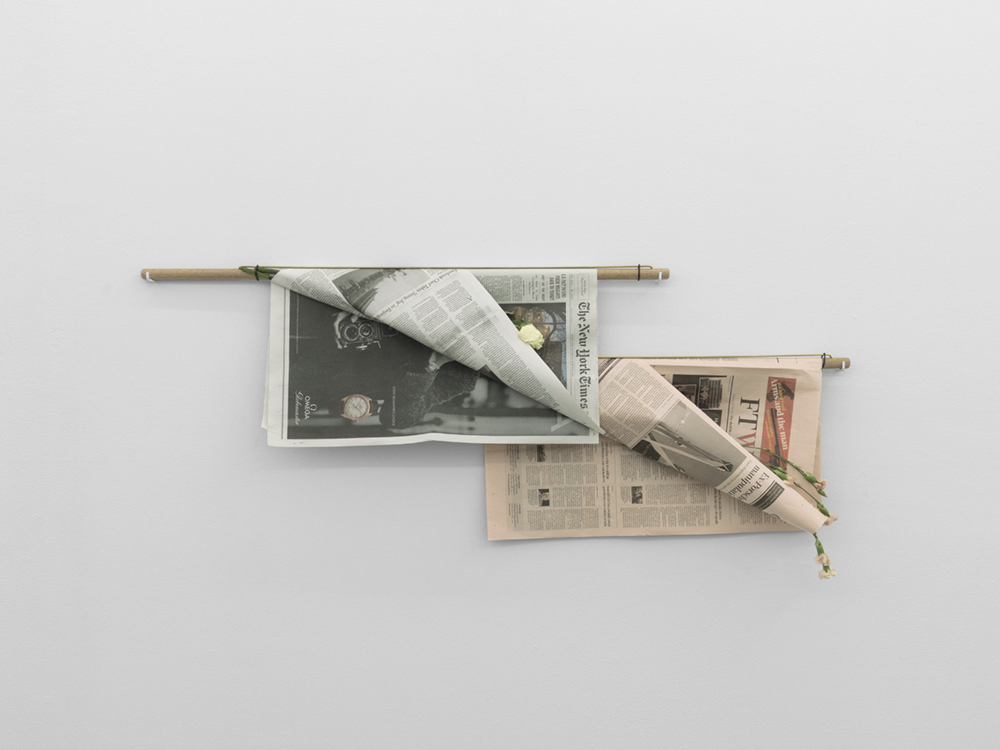
Saturday Newspaper Stick (left)
Sunday Newspaper Stick (right)
newspaper, flowers, oak, brass rod, and rubber ring
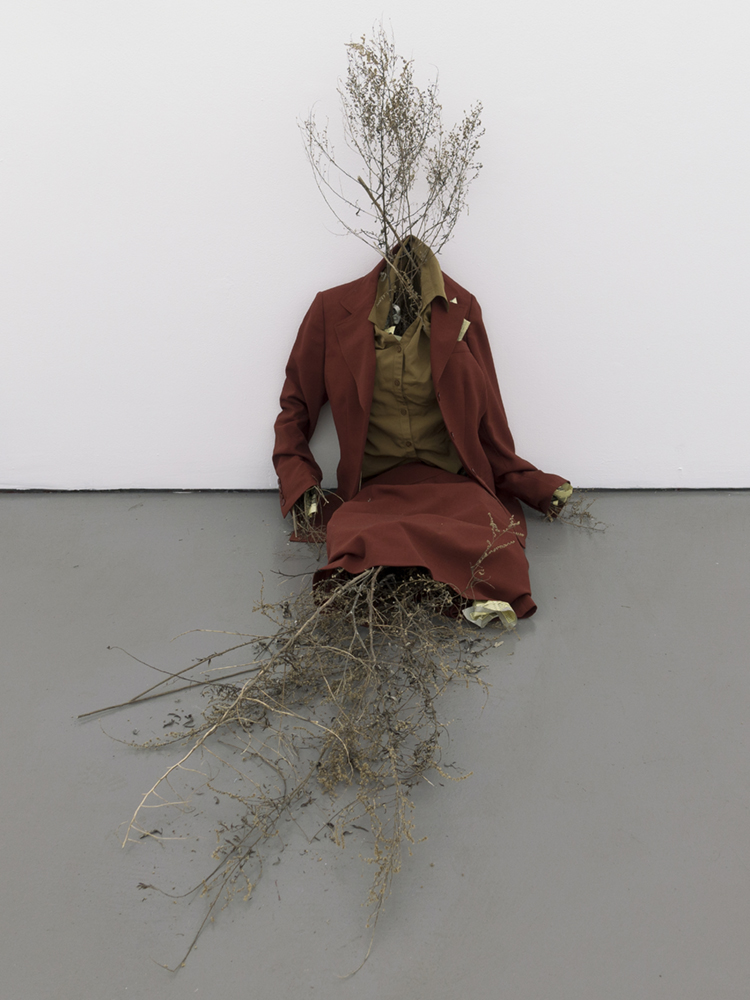
Straw Man (Brooklyn)
skirt suit, blouse, mares tail, wood, and telephone book pages
Blocking
Martos Gallery (Los Angeles, CA)
7.23–8.22.2015
curated by Jesse Stecklow
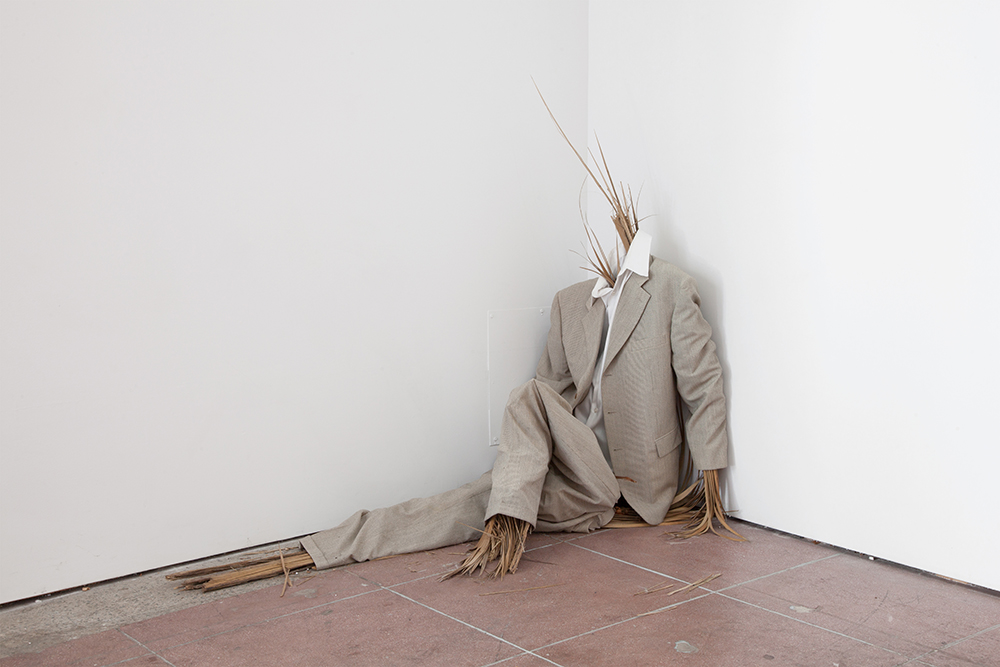
Straw Man (Los Angeles)
two-piece suit and oxford, palm leaves, xerox prints, sweet potatoes, and shallots
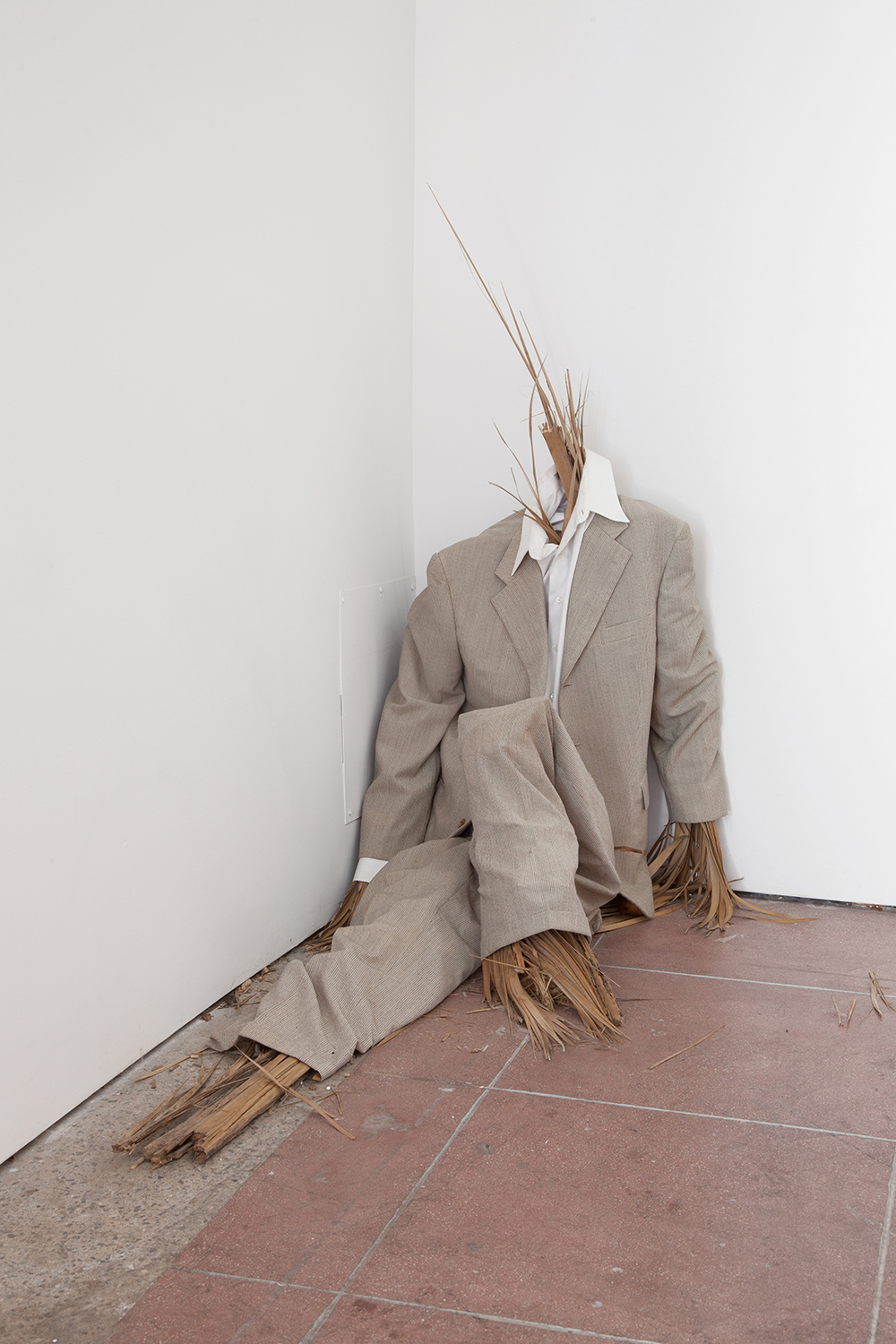
Straw Man (Los Angeles)
two-piece suit and oxford, palm leaves, xerox prints, sweet potatoes, and shallots
Harmonizing with Exhaustion
Levy Delval (Brussels, BE)
4.7–5.7.2015
I don’t want to talk about that place. It’s not that I dislike it—it doesn’t feel exciting or new. We’ve been there a few times; together and separately. It’s a short trip but I’m taking it alone so I take it seriously. Let’s walk through the itinerary; just for this occasion.
Day 2 (6:00) O’HARE AIRPORT - TERMINAL 2, CONCOURSE E
A blue pen, clothes to last 4 days, some old and new notes, and xeroxed essays. You’ve been traveling enough so goodbyes are just a formality to you. You walk away eagerly but not too quickly to upset whoever you’re leaving.
Day 3 (17:00) INLAND STEEL BUILDING, SOUTH ENTRANCE
It’s not your favorite post-depression era building but it always comes to mind. Your steps are irregular and
the .13¢ in your pocket tricks you into thinking the metal in the building is throwing its voice. There are
several compositions. Rectangular plates of metal in different tones: brushed aluminum, faux brass, nickel,
and copper.
Day 6 (14:30) S. R. CROWN HALL, NORTHERN WING
You sit at one of the 46 drafting tables. There’s a feint pestilence of graphite dust. The stale smell tastes like iron, like the aftertaste of blood. Light is casting through the mini-blinds. The sun sieves through the trees and acknowledges you like a blanket.
Brian Khek, May 2015
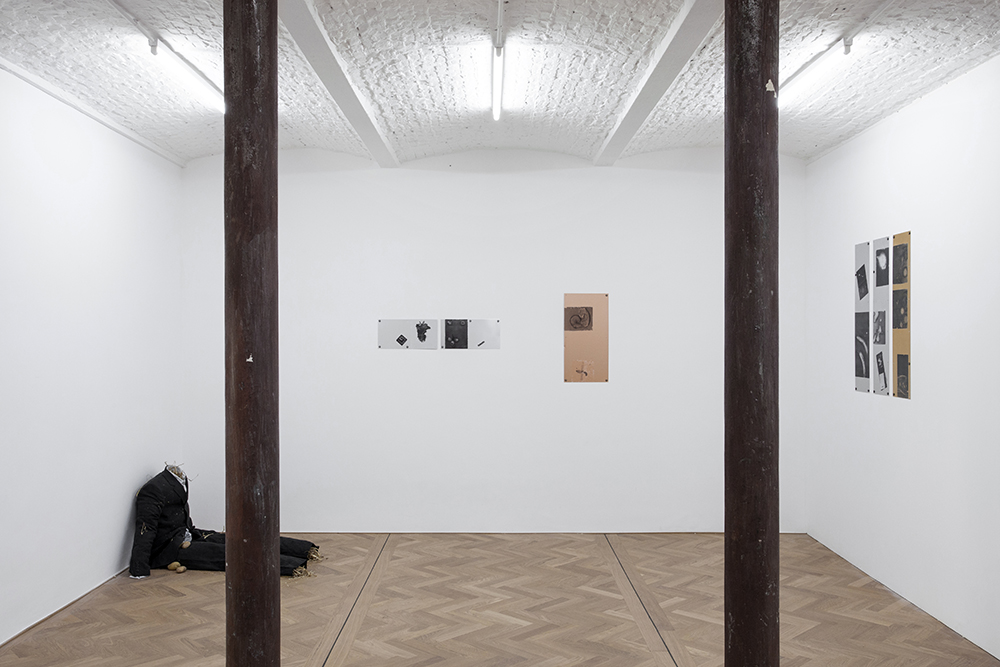
Straw Man (Brussels) and
Terminal, Concourse
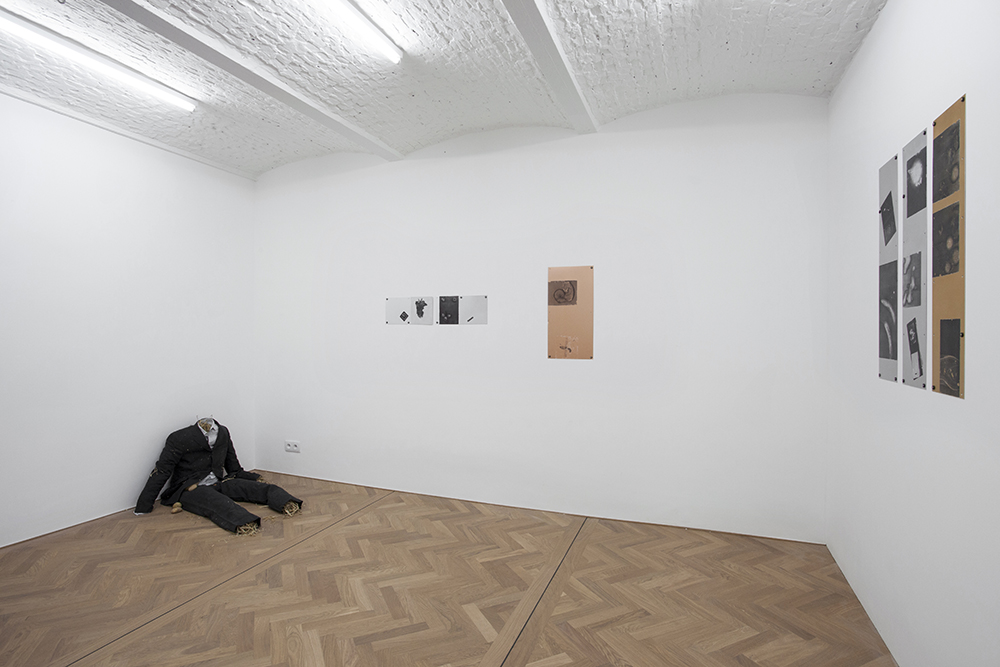
Straw Man (Brussels) and
Terminal, Concourse
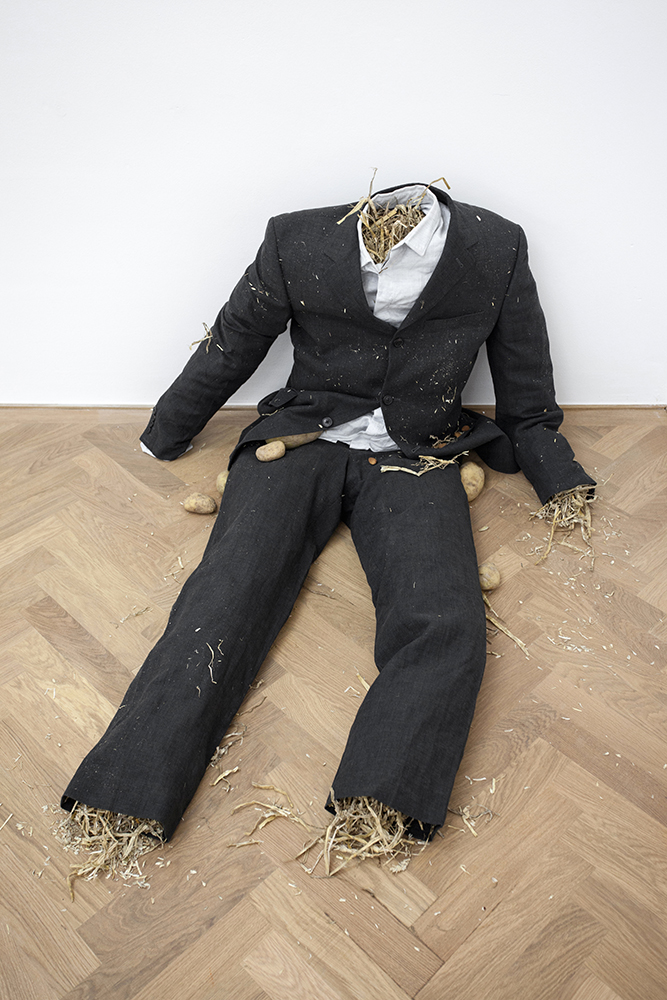
Straw Man (Brussels)
two-piece suit and oxford,
straw, potatoes, and almonds
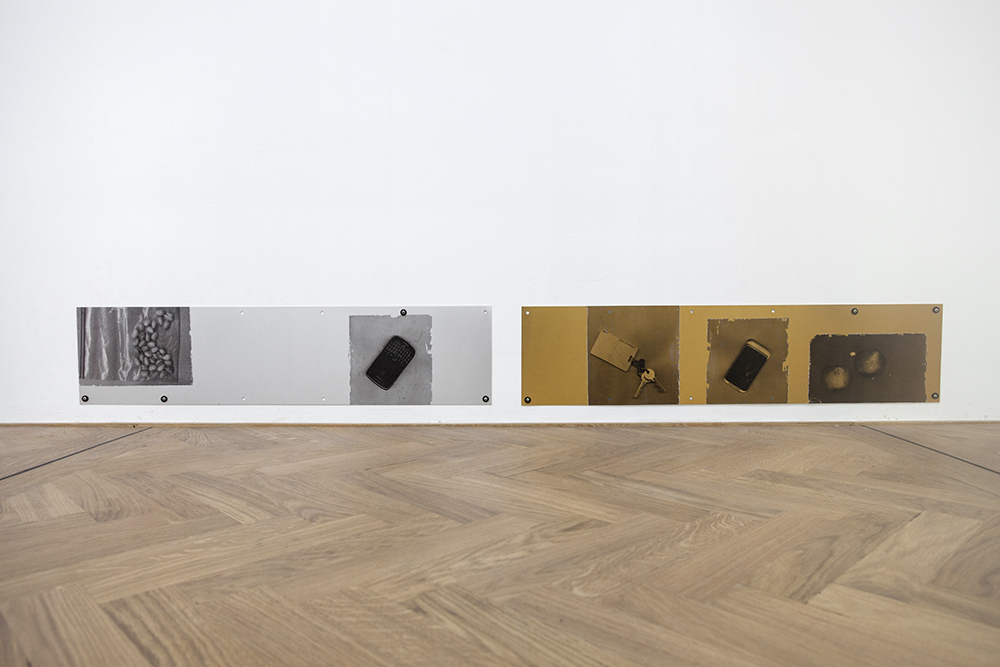
O'Hare: Terminal 3,
Concourse L and K
Xerox-transfer on aluminum and neoprene
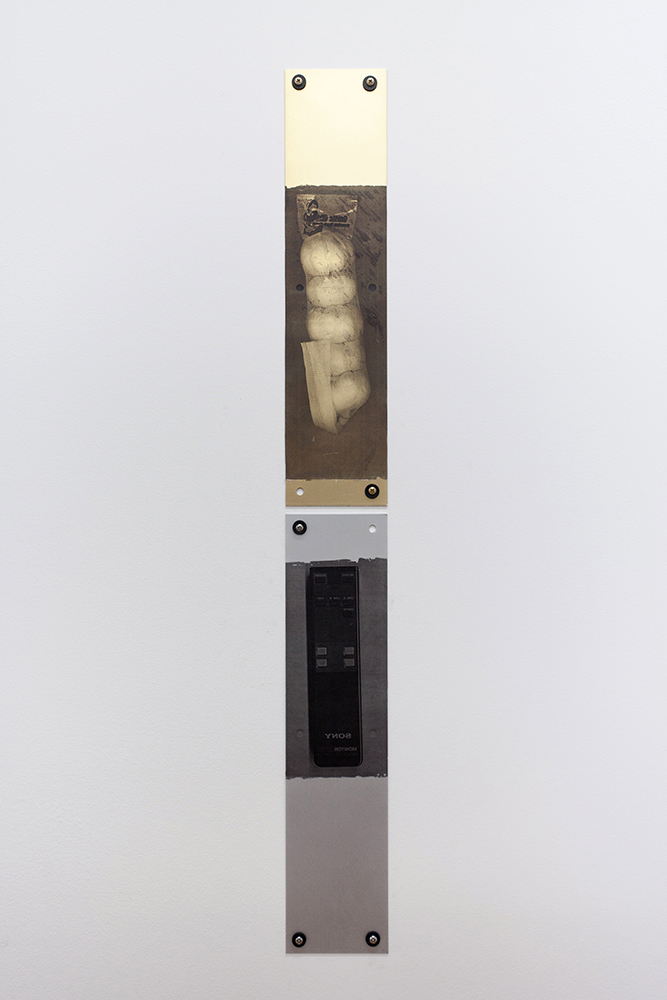
O’Hare: Terminal 2,
Concourse F and E
Xerox-transfer on aluminum and neoprene
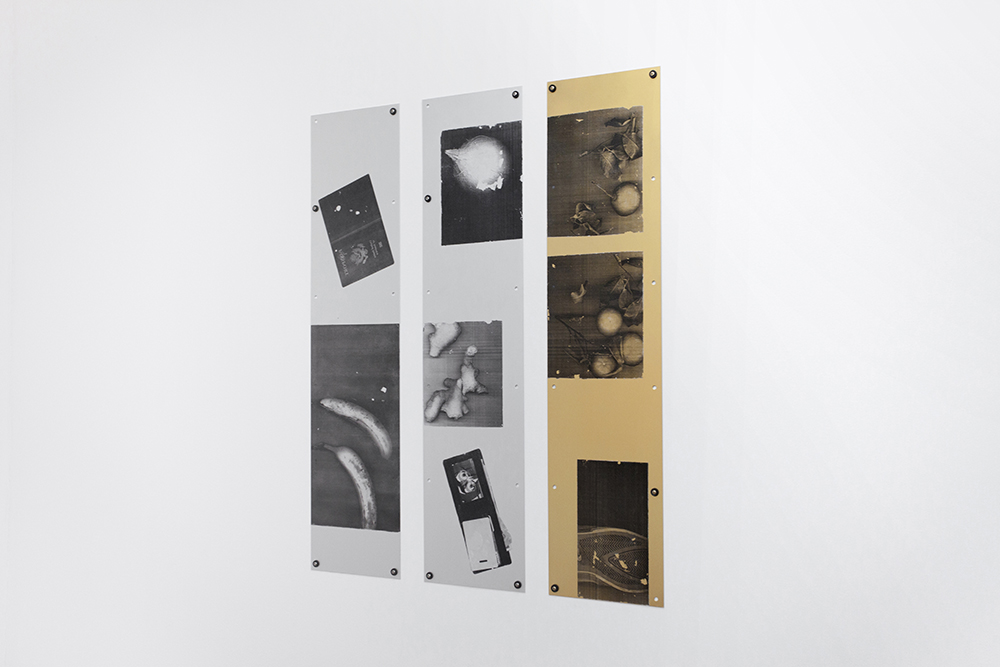
O’Hare: Terminal 3,
Concourse H1, H2, and G
Xerox-transfer on aluminum and neoprene
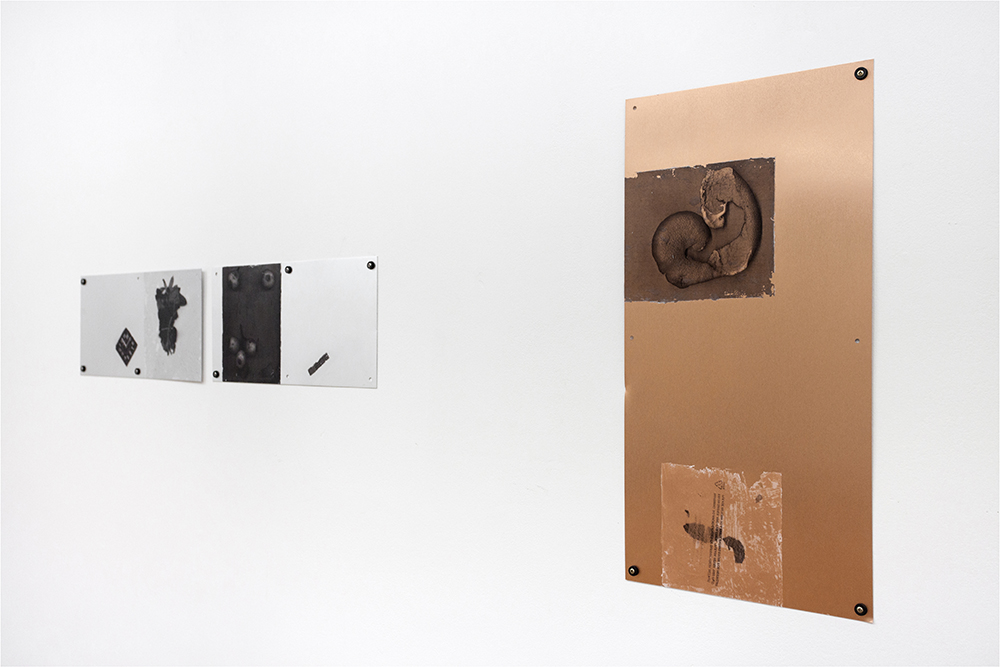
O’Hare: Terminal 1,
Concourse C, Gate C1 and C2 and Concourse M
Xerox-transfer on aluminum and neoprene
Un Pour Le Route
Taylor Macklin (Paris, FR)
11.6–11.13.2014
curated by Adam Cruces
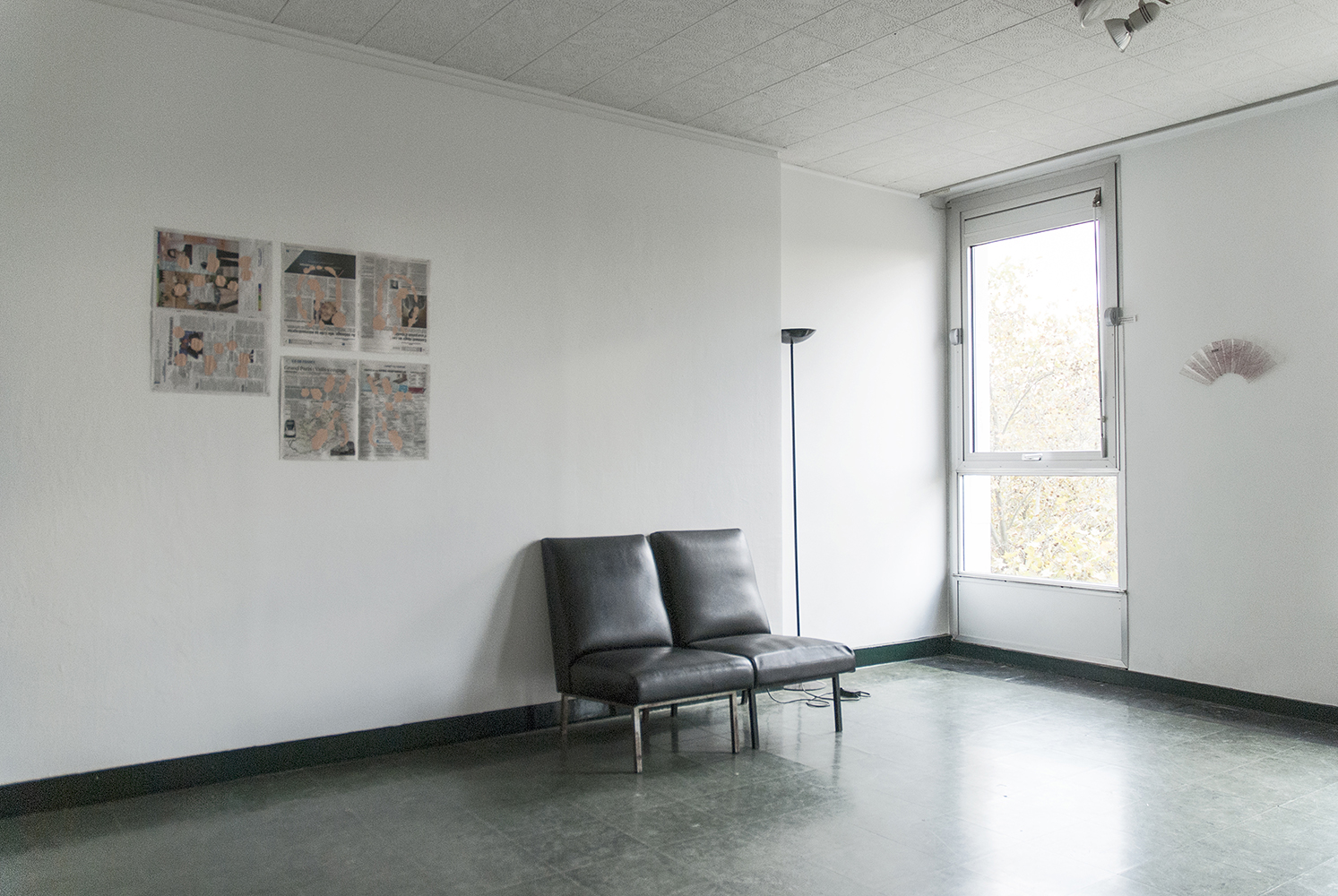
Untitled (left)
(work by Amy Yao on right)
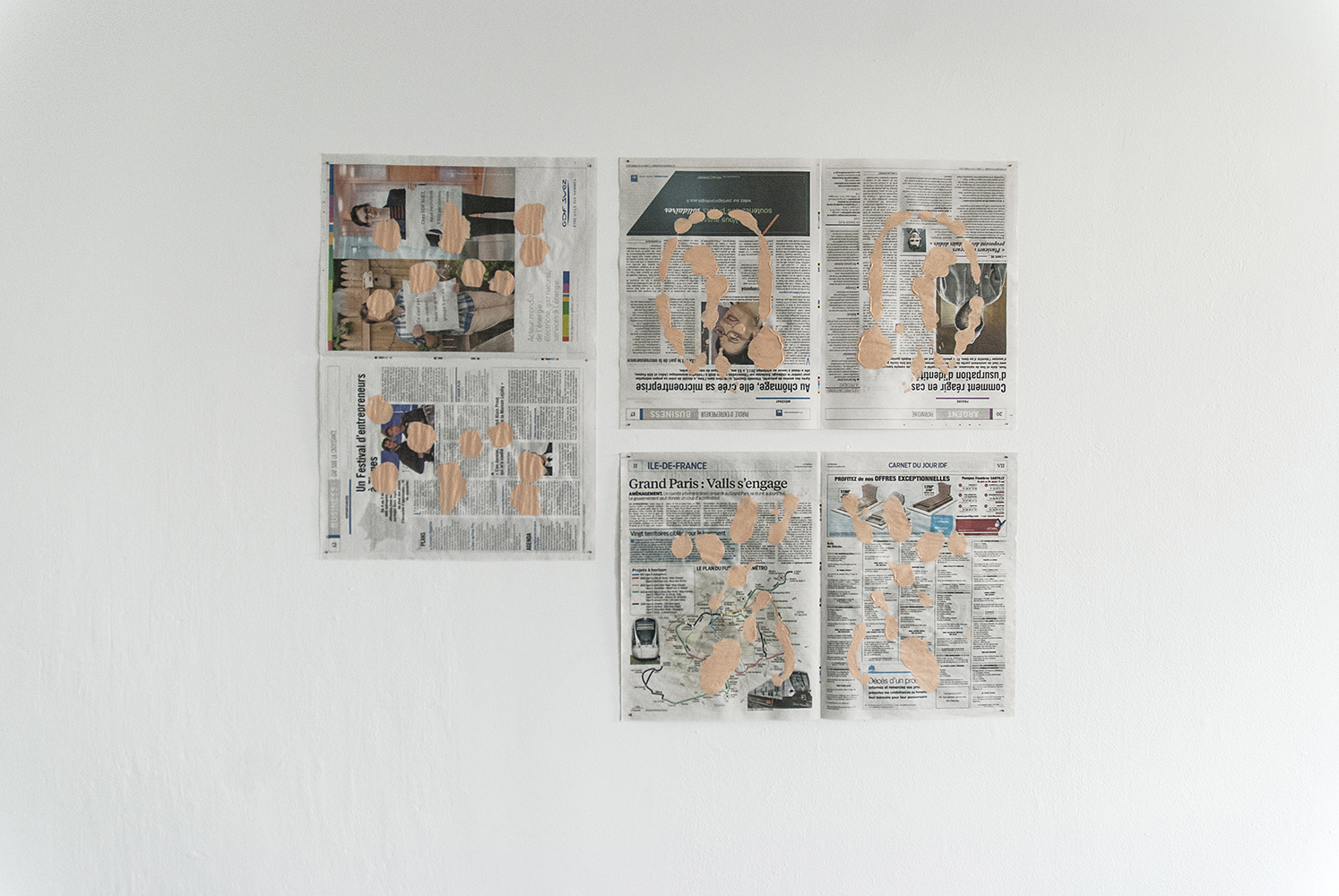
Untitled
acrylic on newpsper
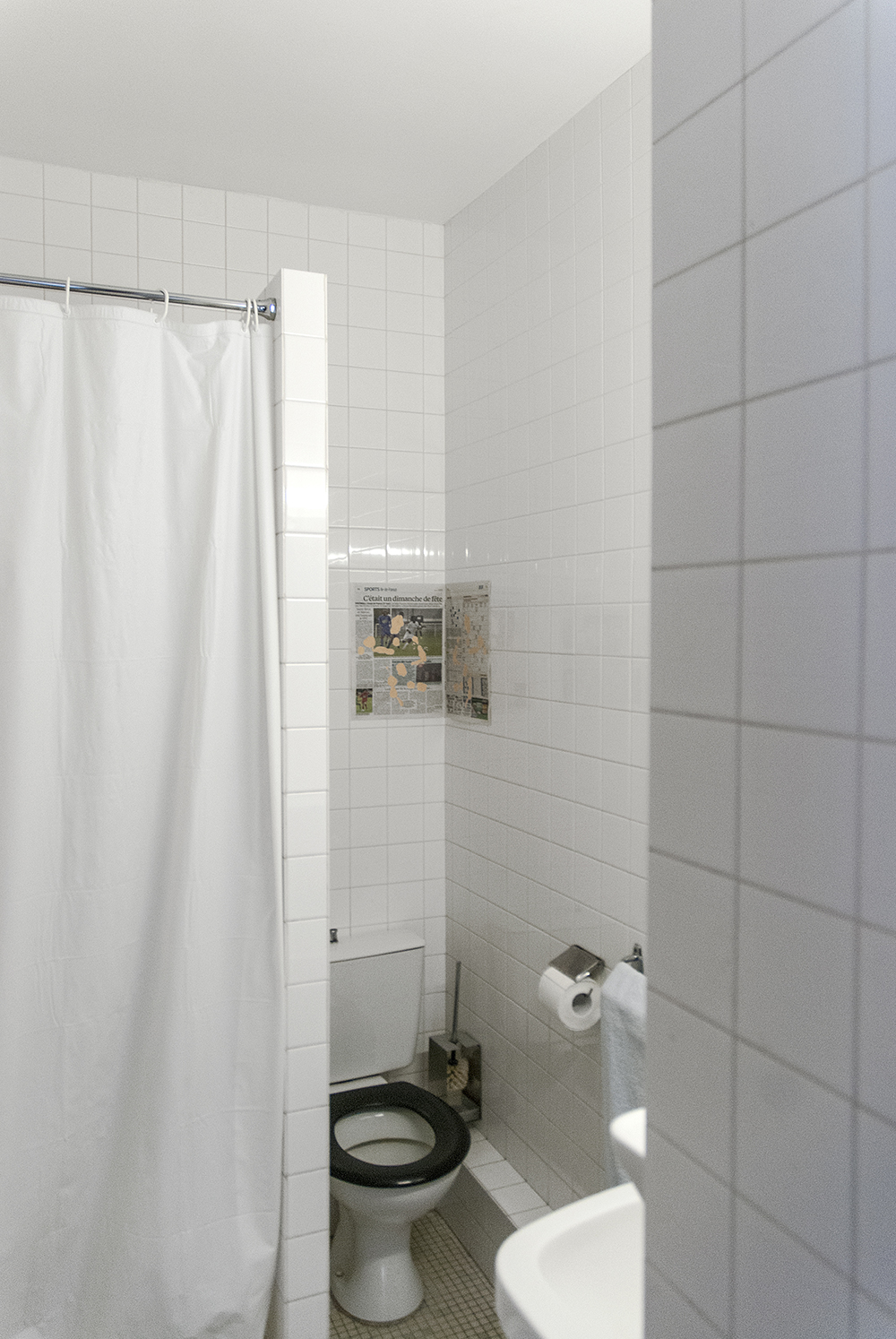
Untitled
acrylic on newpsper
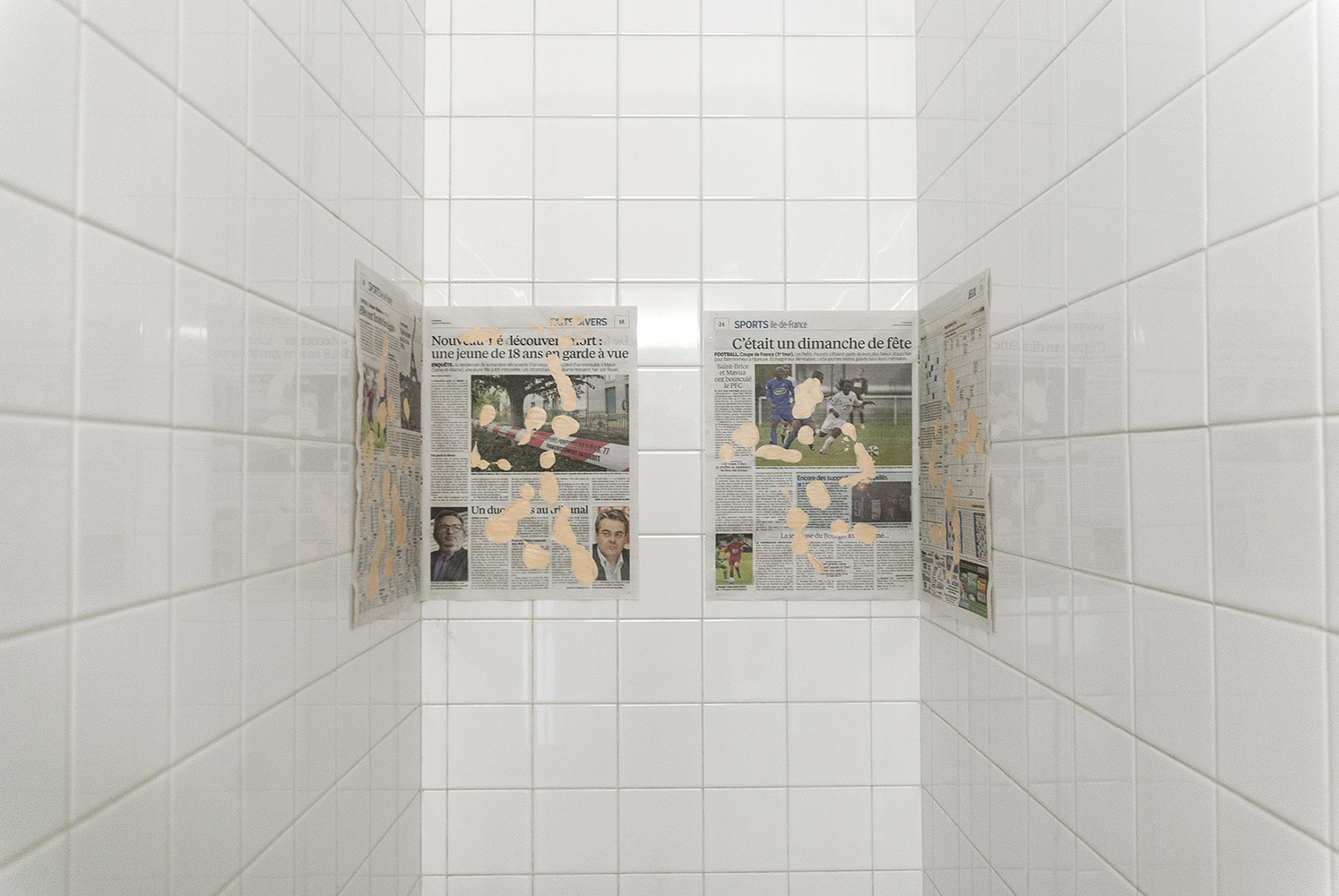
Untitled
acrylic on newpsper
Sister Cities
American Medium (New York City, NY)
2.6–2.8.2014
We grew wheat and hunted to survive. Then roads, places, and skills followed. Now the community we conceived needs something from us, more than a
cup of sugar or your Wi-Fi password. They are taking back their land, customs, and concepts. This is a codependence not between people but of the city
and the city's Name.
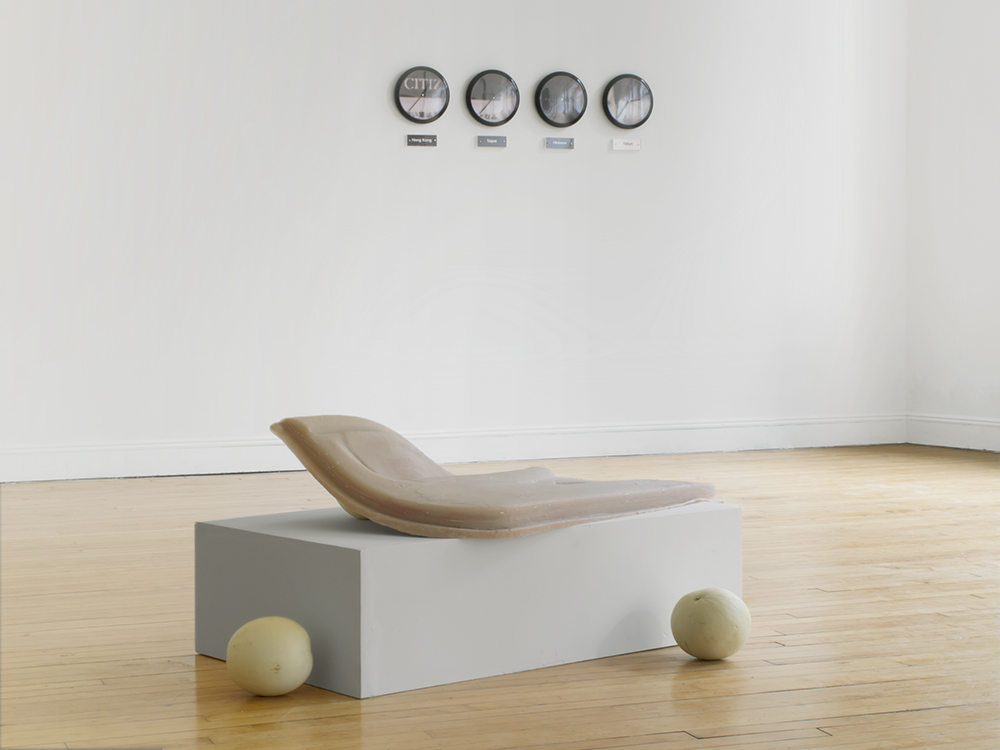
Morgan (left)
Time and Place: C. (right)
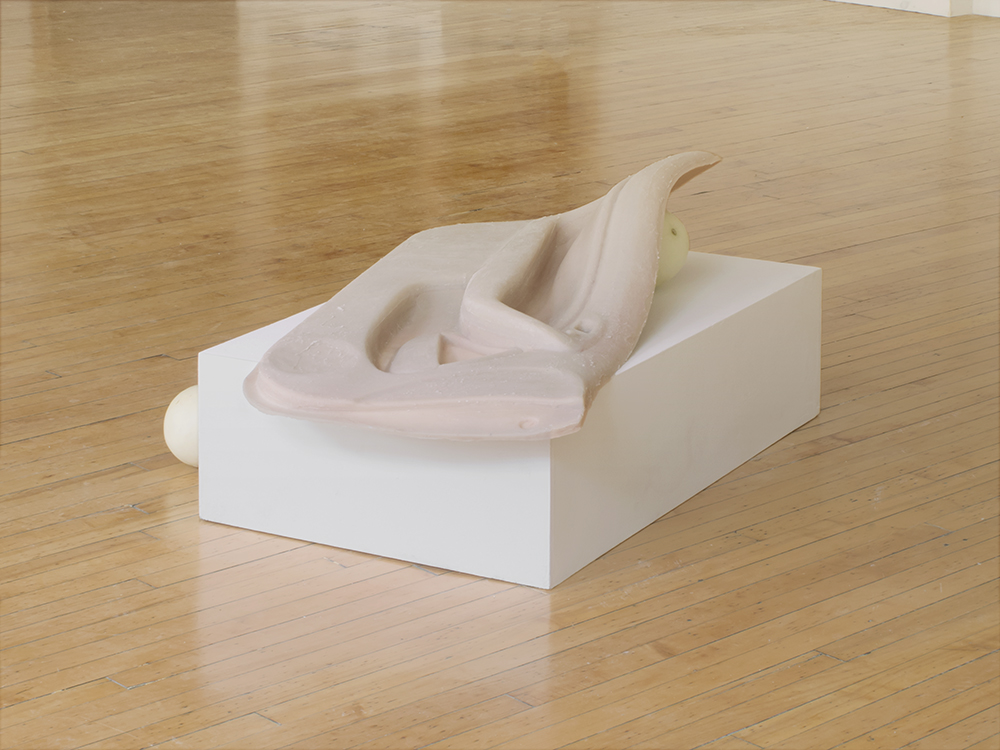
Morgan
silicone, pigment, felt, honeydews, human hair
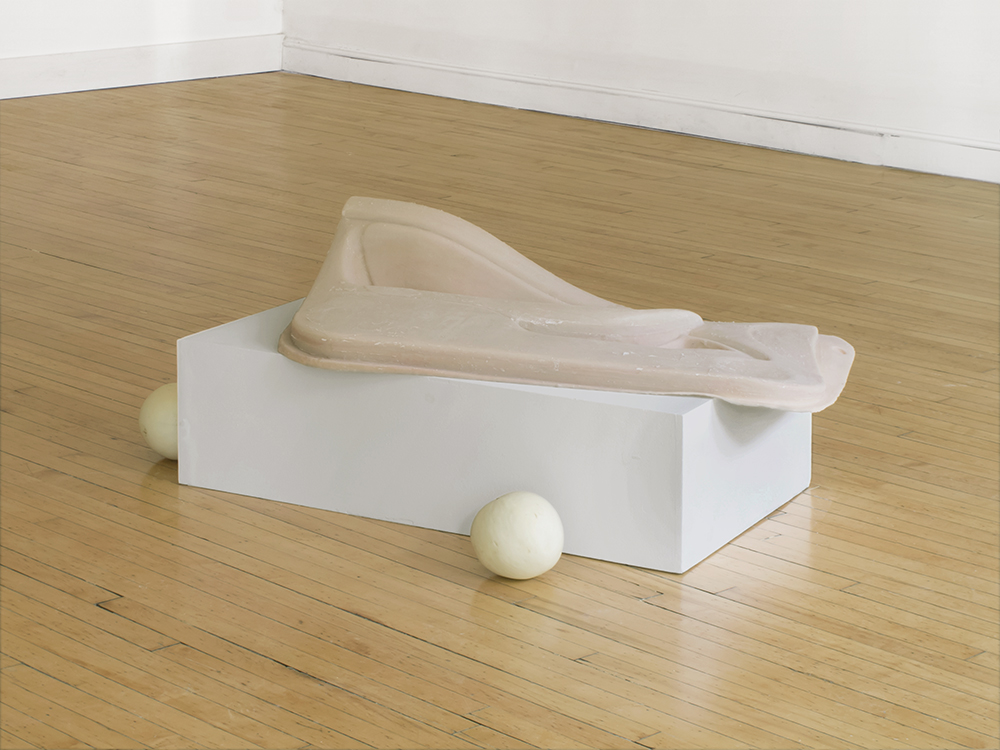
Morgan (detail)
silicone, pigment, felt, honeydews, human hair
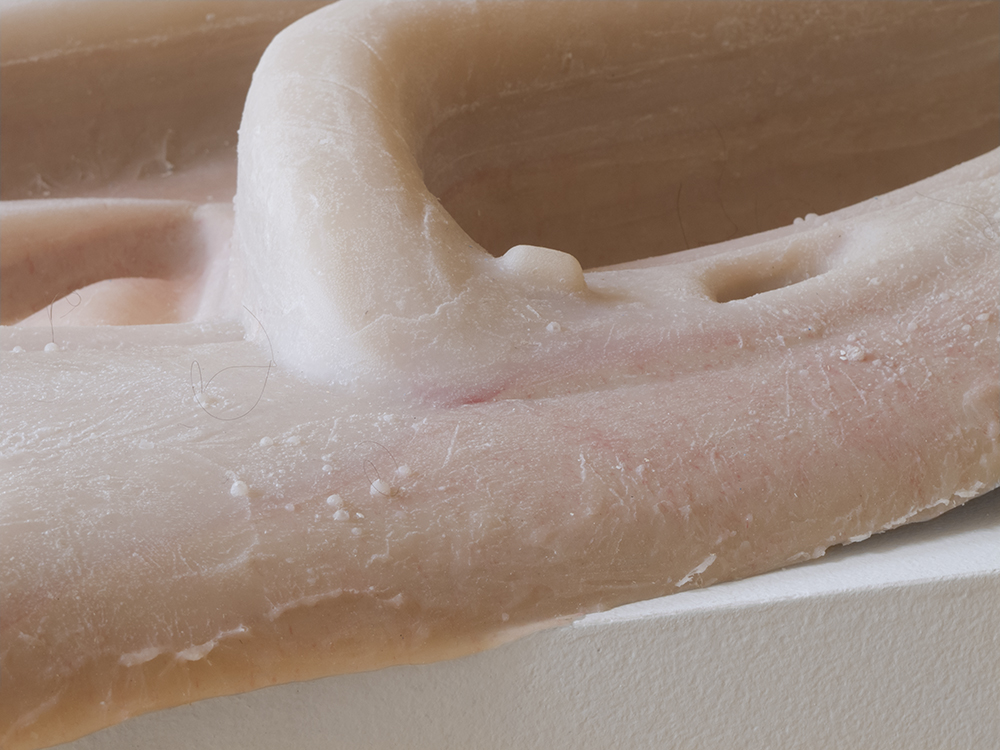
Morgan (detail)
silicone, pigment, felt, honeydews, human hair
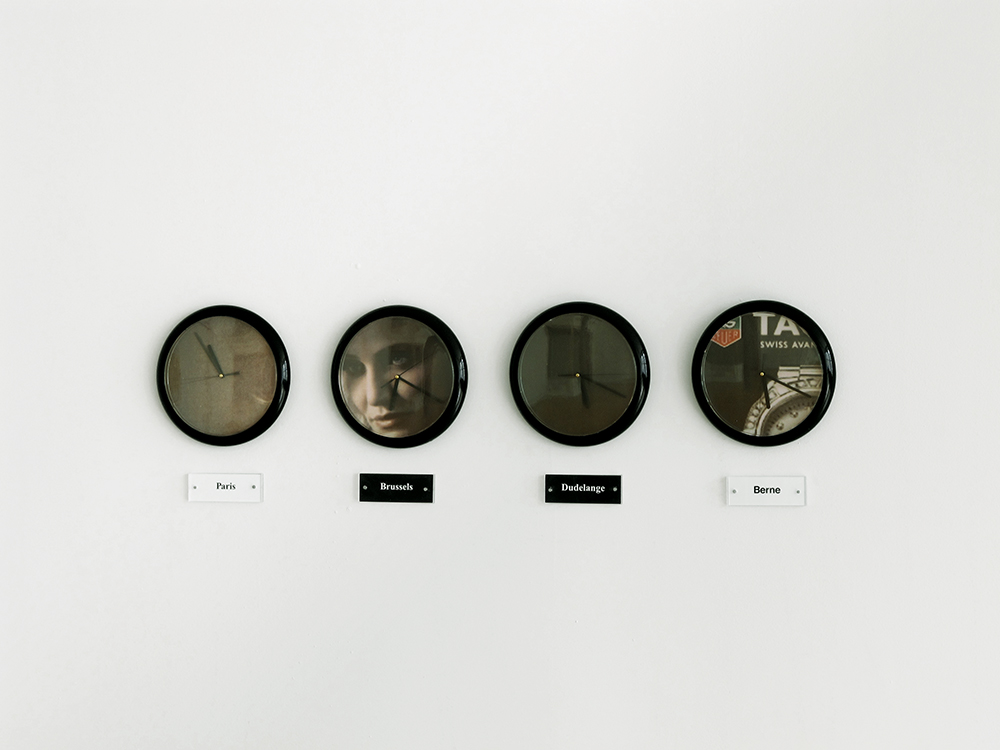
Time and Place: T.H.
analog wall clocks, inkjet prints, acrylic plackards
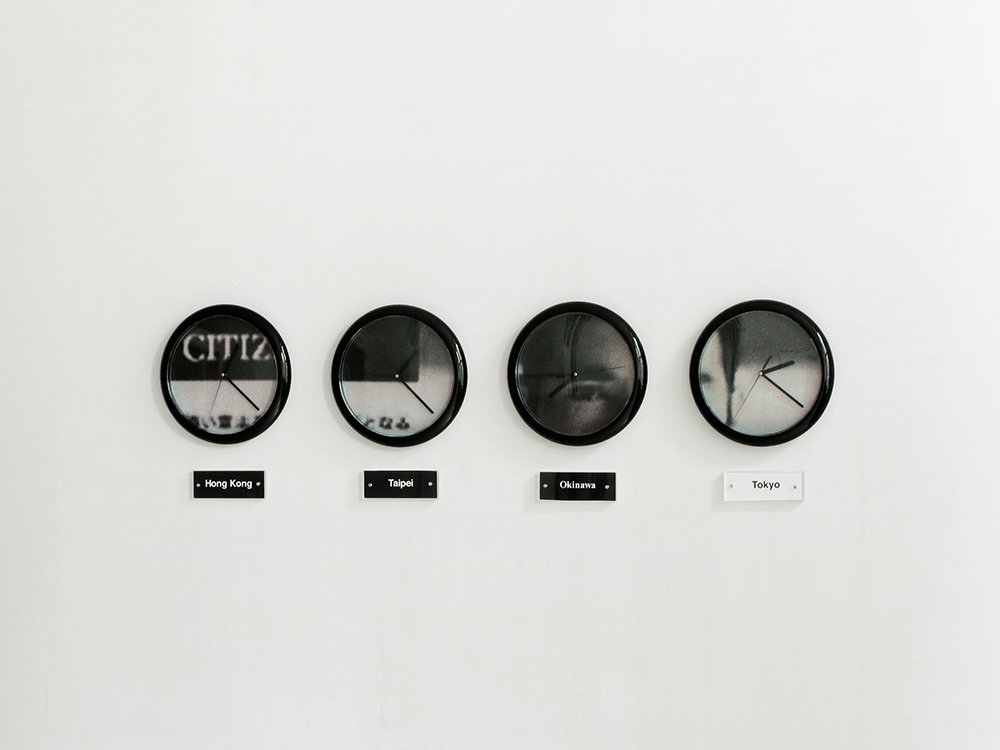
Time and Place: C.
analog wall clocks, inkjet prints, acrylic plackards
Touching You Touching Everything
Appendix Space (Portland, OR)
9.1–10.1.2012
There is an evolutionary effect at play in the objects that connect us. Information sharing has arrived at its current form through a series of related versions
and, like the different beaks of Darwin’s finches, you are here because you have survived. Simultaneously, the state of technology offers a shifting set of constraints to which we continually adapt. We evolve to survive the landscape, we change the landscape, we evolve to survive the landscape. To look at one another, two finches must turn their heads more or less sideways.
Translated, transmitted, or connected through technology, the quizzical finch enters a new field of change, expanded in some capacities and reduced in
others, but, as always, choosing at every step between disconnection and continuity within its medium.
Yet there is no transparent support for being. It is contingent on its physical scaffolding, constituted by its distance from and movement toward the
optimal. The lines running between versions are what we really mean when we say “beak”. But what does the beak desire from the optimal? Or the finch,
for that matter? Can the finch remember itself before its beak, and where are the other finches?
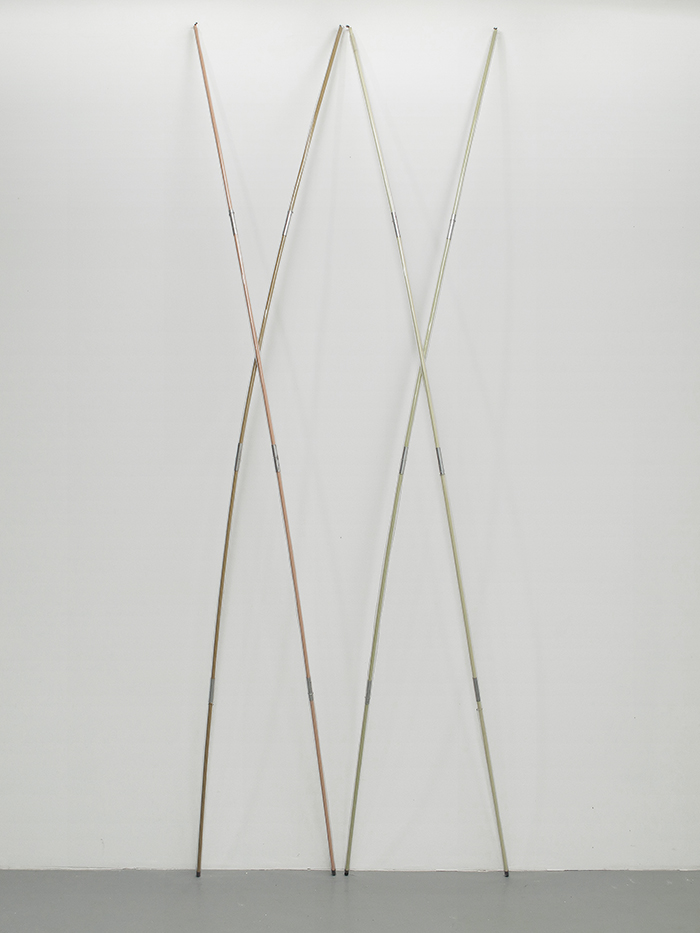
Sand Stone Bone Nude
fiberglass rods, latex paint, PVC sleeves
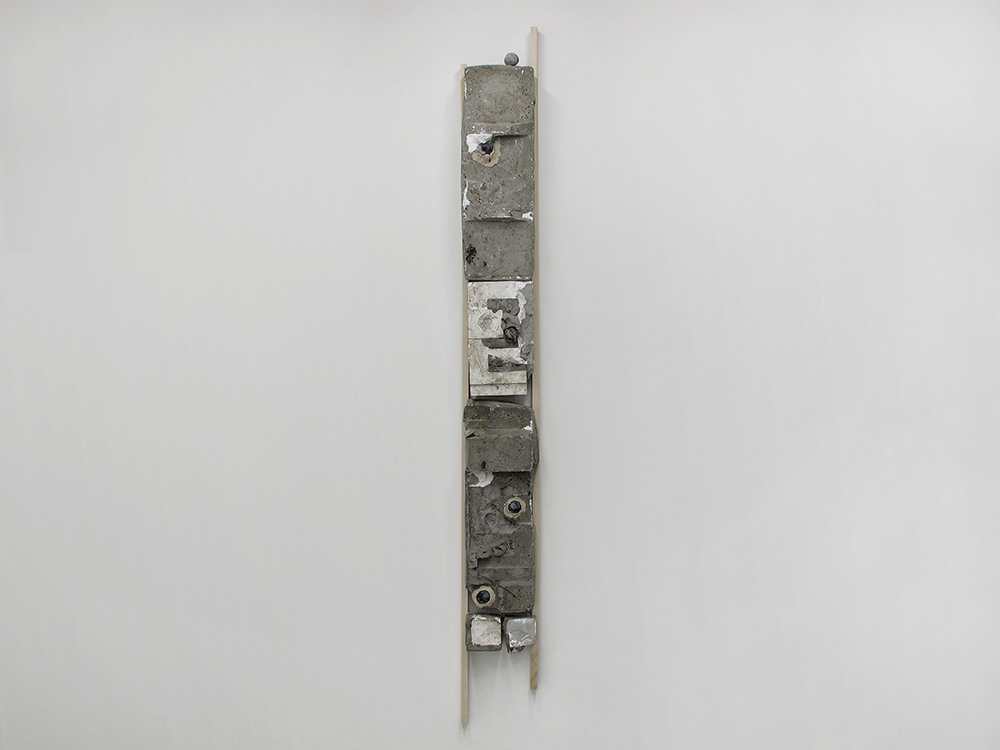
Untitled
cement, plaster, wood, plums, Queen Anne's lace